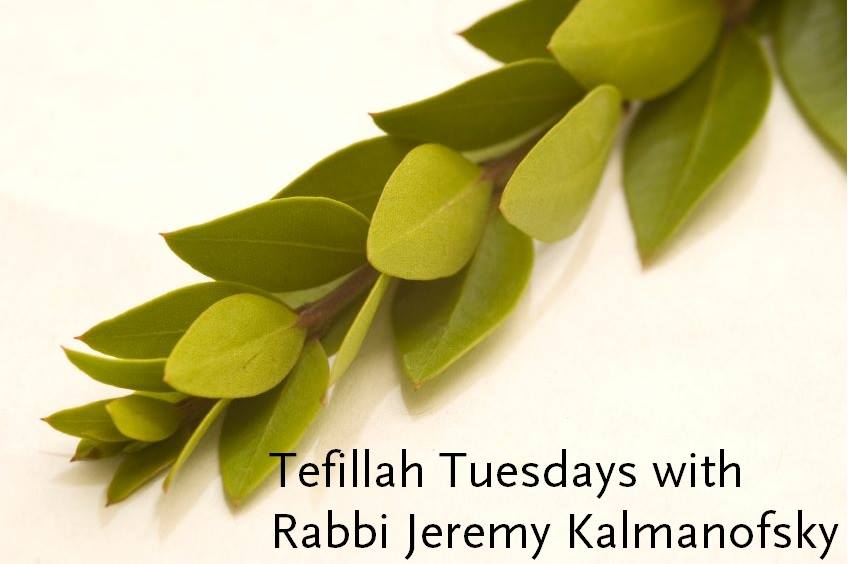I will interrupt my progress through the morning prayers to reflect on the unusual Sukkot liturgy known as Hoshanot, which we chant while marching around the synagogue holding Lulav and Etrog. Depending on your mood, these prayers can feel either fun and funky or just bizarre.
Jews have been doing this parade since Temple times, when each Sukkot day they would march around the altar, adorning it with willow branches; on the seventh day, they would make seven circuits [Mishnah Sukkah 4.5]. We still replicate that pattern, marching around the synagogue once each day of Sukkot, each time reciting a different poem [known as a Hoshana, for its urgently chanted refrain, “Please save us!”] plus one poem that is repeated every day. On the seventh day – called Hoshana Rabba [the great Hoshana] – we make seven circuits, reciting seven different poems. After all that marching and pleading, we whack a small bundle of willow branches on the ground, their falling leaves indicating our sins falling away.
For us moderns, raised to appreciate rational, ethical monotheism, this strange stuff is a salutary reminder that Judaism’s roots sink deep into a mythic aquifer. You cannot fail to feel that this ritual is magic, in both senses of the term: It is enchanting; and it is hocus-pocus, an incantation of magic words and waving magic wands to influence God to grant enough rain so we don’t all die of drought.
Let’s focus on the poem אני והו [Ani Va’Ho], which concludes the Hoshana chant each day of the holiday [except Shabbat]. Despite its admittedly difficult Hebrew, this poem is profound and theologically daring, a rich resource for Jews davvening today.
The poem we recite is apparently quite old. Already in the 2nd century, the Mishna cites the אני והו as the liturgy for the Temple’s willow ritual, although that doesn’t mean that our poem is necessarily that old. The other Hoshanot were composed in the 6th and 7th centuries, and this poem shares their common literary features. In the 11th century Rashi commented on our version [see Netiv Bina 4.260], which also appears in the early 12th century French siddur called Machzor Vitry.
What makes this poem so deep and daring is its complex understanding of God’s power. Religions often stumble on the problem of unjust suffering. If God is all-good, all-knowing and all-powerful, how can bad things happen? There are only a limited number of possible responses. You could say unjust suffering is an illusion, that it’s not really undeserved or not really that bad, but that’s an impossible answer after the Shoah, or before a sick child. Or, you must restrict one of God’s “all-”s. Maybe God’s not all that good, or perhaps too busy to know the pain of each mortal being.
Our poem – like the Kabbalah and certain strains in rabbinic thought – adopts a different approach. This poem claims that suffering and exile beset not only us poor mortals. Even God can be trapped by the injustice and alienation of the world, and doesn’t seem omnipotent enough to just pronounce My will be done! We may need salvation in this crazy world, but so does God, in the poem’s words: גוי וא’לוהים דרושים לְיֵשַׁע א’לוהים, “both a nation and its God seek divine salvation!” The Talmudic era term for this is shekhinta b’galuta, the divine presence accompanied Israel when it was banished into exile. As our poem says קהלות בבלה שִׁלַּחְתָּ – רחום למענם שֻׁלַּחְתָּ, “when the community of Israel was exiled to Babylon, Merciful One, You were banished along with them.”
The same pattern held true all the way back in Egypt. Pharaoh enslaved not only Israel, but also God, as our poem relates, with great boldness: מאמר וְהוצֵאתִי אֶתְכֶם נקוב וְהוּצֵאתִי אִתְּכֶם, the Torah’s divine promise [Exodus 6.6]: “‘I will take them out from Egypt’s burdens,’ should be emended to read that ‘I was rescued from Egypt along with them.’”
The God of this poem is not a transcendent cosmic ruler, impervious to mere human affairs. When you davven Ani Va’Ho, you feel that Hashem is so thoroughly part of the world that we both need liberation and healing. If we could take a time machine to ask the author of this poem, he would not likely have said that God is weak, or less than fully omnipotent. But he would also have asserted with the words of Psalm 91: עמו אנכי בצרה, as midrashically interpreted, “I suffer along with people.”
So what does the enigmatic title אני והו Ani Va’Ho mean? There is no one certain answer. It may refer to a mystical name of God, as Rashi says [Sukkah 45a]. Most commentators understand this term to refer to God’s relatively powerless experience of divine exile. For example, Maimonides, pronouncing the term אני והוא Ani Va’Hu [“I and He”], says it refers to “One who I and He suffer together should save us.”
In that interpretation, the term ani, or “I,” simply refers to the praying Jew, while Hu refers to the divine “He.” Following those lines, I will leave you with a brilliant interpretation of R. Israel Lipschutz of Danzig [1782-1860], in his Mishnah commentary Tiferet Israel. “It is proper that ani should come before Hu,” he wrote. “For all things must begin with effort from earth, before there can be response from heaven.” When you pray for salvation, and call out ani Va’Ho, save us!, remember that salvation begins with Ani. First, I must work, and then I can watch for God’s response.





